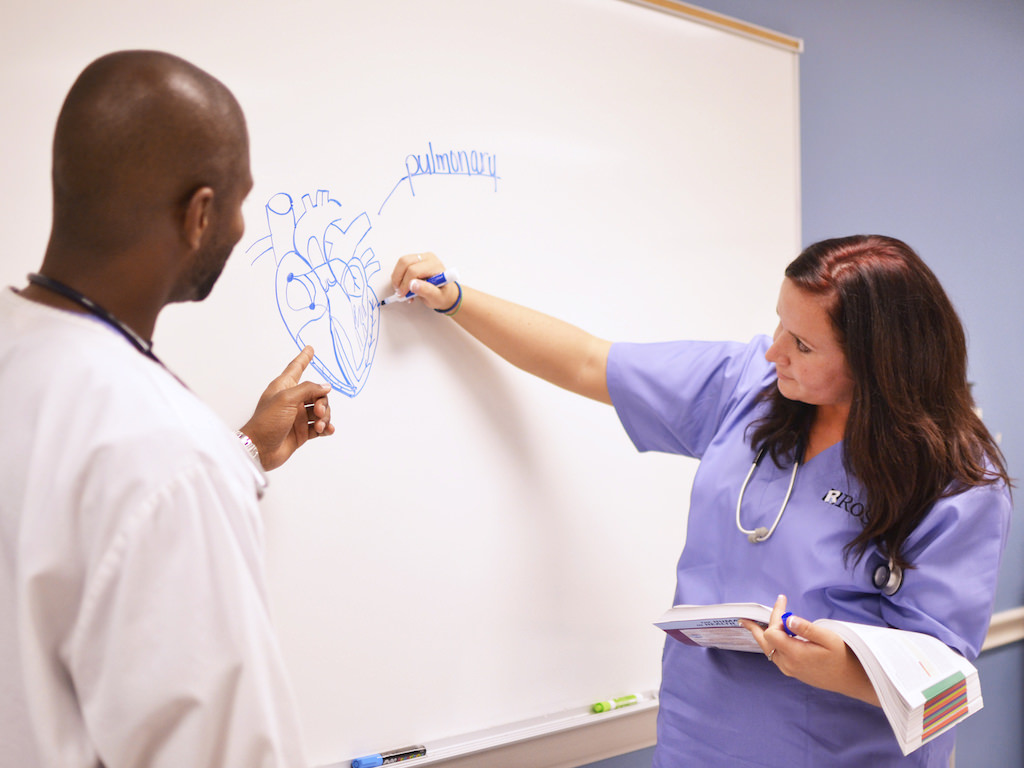 No matter which of our healthcare training programs you are enrolled in, one unavoidable thing you will have to learn is medical terminology. Although some of the terms may differ slightly, those medical terms are pretty universal and we know that some of them can be difficult to keep straight. Have you been working hard to study and are somehow still struggling to remember it all? Check out some of these hacks that can make learning and remembering medical terminology a breeze!
No matter which of our healthcare training programs you are enrolled in, one unavoidable thing you will have to learn is medical terminology. Although some of the terms may differ slightly, those medical terms are pretty universal and we know that some of them can be difficult to keep straight. Have you been working hard to study and are somehow still struggling to remember it all? Check out some of these hacks that can make learning and remembering medical terminology a breeze!
Studying doesn’t work if you don’t.
Before we get into all of the specific hacks and tricks, make sure that you are actually following the study tips we wrote about already this month! The best way to study is to find the best way for YOU, so make sure that you are blocking out distractions, taking breaks, and learning the way that you learn best!
It’s all Greek to me!
One of the things that can make studying medical terms far easier is learning some of the Greek and Latin roots in them. Some terms are just Greek, some just Latin, and some are a combination. That may sound overwhelming, but it doesn’t have to be! For example, the word “dermatitis” means inflammation of the skin, right? How do we know?
The root “derma” is from the ancient Greek word for “skin” while the end is “itis” which indicates inflammation. Knowing that, we can then assume that other words with similar roots have related meanings. Examples include laryngitis (inflammation of the larynx), bronchitis (inflammation in the bronchial tubes), gastritis (inflammation of the stomach lining), and many others.
You don’t have to become a Greek and Latin scholar, but wouldn’t it be nice to increase confidence with your medical terms as well as impress friends, family, and maybe even your instructor with your knowledge of some common roots? We think so too!
Memorization in a flash… card!
We mention these magical little cards in our earlier post about study tips, but they are just that helpful! If you keep yourself stocked with 3×5 index cards, you can continuously add to your collection. Don’t study alone, bring your classmates, friends, or even children in on the fun! Kids will probably enjoy that you are using the same tools they do in school and may even learn or thing or two!
If you aren’t interested in going through the work of making your own, you may be able to buy some that have been professionally created and printed. And if you don’t want to carry around a stack of cards nor do the work to create them, there are also a lot of online flashcard resources and even collections of cards that people have created for their own medical terminology studies!
Use your strengths!
Do you know what your learning style is? There are a variety of learning style quizzes that you can find online, like this one. They may give you an idea of whether you are an visual, auditory, or kinesthetic learner. Here are some ideas for each one:
- Visual: Read over the words and use the pictures in your textbook, worksheets, or online resources to study!
- Auditory: Listen carefully during lectures (maybe even record them if you are able), and then take time to process through what you are learning out loud. You can do that to yourself, or make it more fun with a classmate or even a friend or family member! Teach what you are learning to someone else!
- Kinesthetic: Anytime you can, practice what you are learning! Create models, draw pictures, act things out! When those aren’t options, write the terms down. Writing each term ten times while thinking about its meaning can work wonders for your memory!
Chances are that you aren’t just one type of learner. You are likely a combination of a few of them. Combining these activities and strategies will deliver the best results.
Make it a game!
Remember all of those review games that you played in school? Your teachers spent times making those things because they work! When we have fun, we often forget that we are doing the hard work of learning, and a little friendly competition can do wonders for encouraging your brain to work harder to retrieve stored information. So, play a game of medical term bingo with friends or explore some online resources like this trivia game.
Use your imagination!
As you learn new words, create pictures in your mind that you can associate with the word. You can even make up rhymes, songs, stories, or abbreviations to remember things quickly and easily by grouping them together. You may have learned the order of the planets as My Very Educated Mother Just Served Us Nine Pizzas (Mercury, Venus, Earth, Mars, Jupiter, Saturn, Uranus, Neptune, Pluto). You remembered that because you grouped them and remembered a phrase that you already knew. https://www.youtube.com/watch?v=VxifB4_GILI
Interested in more resources?
Here are a few to get you started. We’d love to hear about others that you use – share them on the Ross Facebook page so other students can use them too!
Want to put all this new information to use? Check out our healthcare training programs offered at our Ross Medical Education Center locations!
- Medical Assistant
- Medical Insurance Billing and Office Administration
- Dental Assistant
- Pharmacy Technician
- Veterinary Assistant
